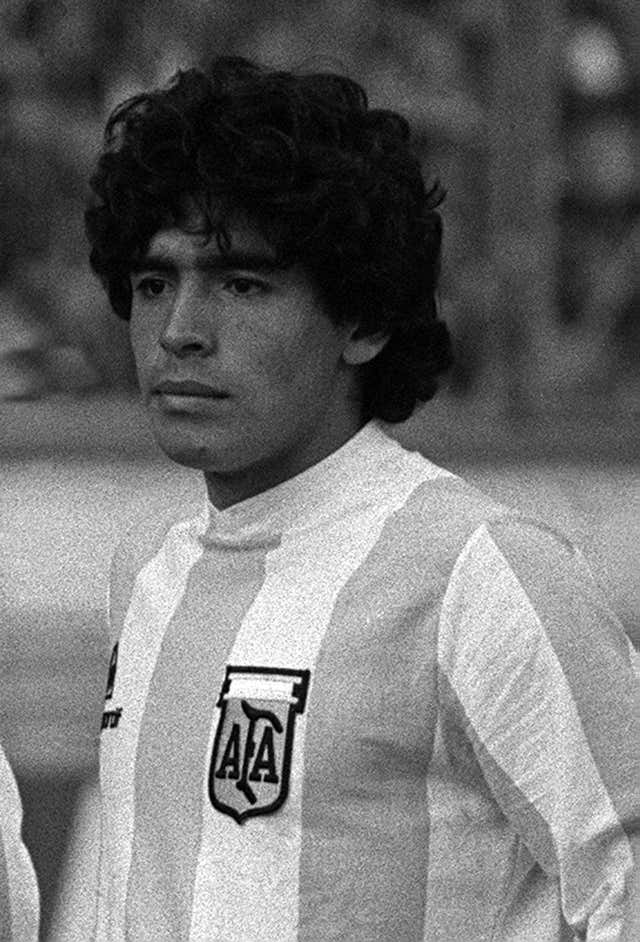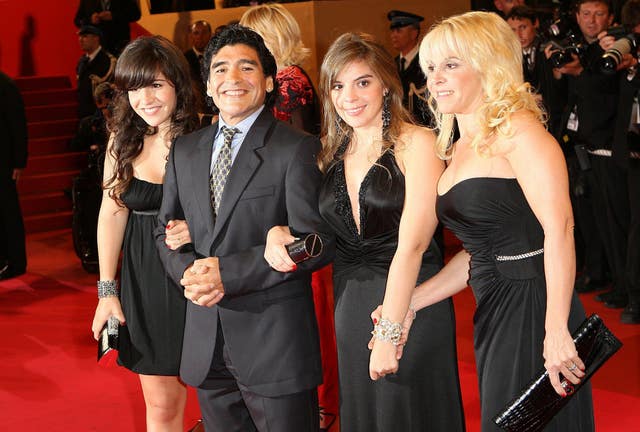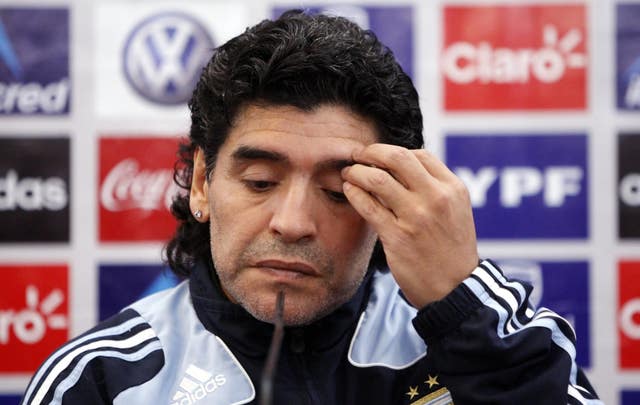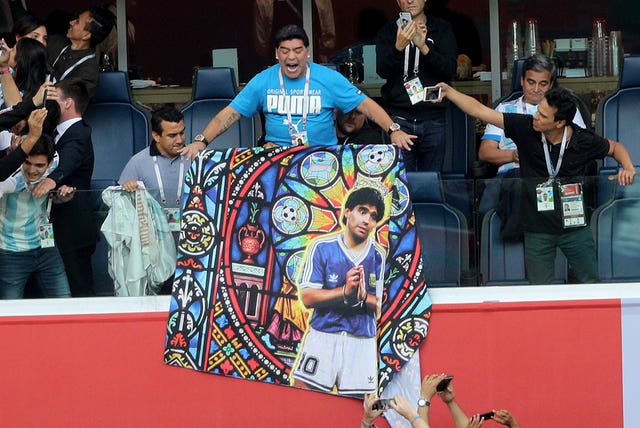
Diego Maradona, widely regarded as one of the greatest and most controversial footballers of all time, has died at the age of 60.
Here, the Press Association agency looks back at the highs and lows of his colourful career.
Highs
Winning World Cup in 1986
🗓 29 June 1986
A day that Diego Maradona will never forget – the day that he captained his side to FIFA #WorldCup glory 🇦🇷 🏆
Full video 👉 https://t.co/9XU2OSOy1N pic.twitter.com/3iJvmt5AuT
— FIFA World Cup (@FIFAWorldCup) May 9, 2018
As their inspirational captain, Maradona almost single-handedly guided Argentina to World Cup glory in 1986. He went to the tournament in Mexico regarded as a the best player in the world and he fulfilled expectations, scoring five goals and setting up another five in a series of superb performances that culminated in final victory over West Germany.
‘Goal of the Century’ against England
🧙♂️ Maradona Magic 💫
🗓 #OnThisDay in 1986, Diego Maradona scored one of the greatest goals of all time
👀 Let's take a closer look at "El Pibe de Oro's" immortal 11-second dash#WorldCup | 🇦🇷 @Argentina pic.twitter.com/6pnlBiPYC4
— FIFA World Cup (@FIFAWorldCup) June 22, 2020
Along the way Maradona scored what is widely acclaimed as the greatest goal ever scored against England in the quarter-finals. Although he earned equally negative headlines for another, rather more notorious, goal he scored in the same game – more of which later – Maradona encapsulated everything that was good about his game in a mazy run and dribble that began inside his own half and ended with him sliding the ball past Peter Shilton. It was voted Goal of the Century in a FIFA poll in 2002.
Precocious talent
 Maradona was an exciting young talent (PA Archive)
Maradona was an exciting young talent (PA Archive)
Maradona was a precocious childhood talent and burst on to the grand stage as a teenager. He made his professional debut for Argentinos Juniors at the age of 15 and earned his first Argentina cap at 16 years and 120 days.
READ MORE: Diego Maradona dead: Icon behind 'Hand of God' goal dies aged 60
Winning two Serie A titles
🇦🇷 Happy 60th birthday to Napoli legend Diego Maradona! 🔵
🏆1⃣9⃣8⃣9⃣#HBD | #UEL pic.twitter.com/2XBHrZkCTd
— UEFA Europa League (@EuropaLeague) October 30, 2020
Napoli pulled off a coup to sign Maradona for a then world record £6.9million fee in 1984. He inspired the club to Serie A successes in 1987 and 1990 as well as the UEFA Cup in 1989.
FIFA Player of the Century
World governing body FIFA decided to create an honour for the best player of the past 100 years at the turn of the century. It ended up being a joint award with organisers unable to separate Pele, the three-time World Cup winner with Brazil, and Maradona.
The ‘Hand of God’
🇦🇷1⃣-0⃣🏴. Diego Maradona gives @Argentina the lead.The 2nd half continues at: https://t.co/4nzGnwIrUm pic.twitter.com/MHcZuVxHqD
— FIFA World Cup (@FIFAWorldCup) March 24, 2018
Maradona’s World Cup success will be forever be remembered by his goals against England. His first of the two he scored in the quarter-final against England was pushed in with his hand as he challenged Shilton for an aerial ball. England protested but the officials missed the offence and Maradona was happy to take advantage. He admitted what he had done after the game by describing the goal as from “the hand of God”.
Lows
Losing 1990 World Cup final
💥🎙️ E. Codesal, ÁRBITRO de la FINAL del MUNDIAL de 1990: "MARADONA es de las PEORES PERSONAS que conocí en mi vida. Debí EXPULSARLO antes del partido". (Vía Tirando Paredes) pic.twitter.com/Kl8qmXUWpr
— El Chiringuito TV (@elchiringuitotv) April 26, 2020
Maradona captained Argentina again in Italy in 1990 but hopes of repeat success ended in tears as West Germany avenged their loss of four years previously in an ill-tempered final. Despite reaching the showpiece, it was not vintage Argentina. They suffered a shock loss to Cameroon in their opening game and only scraped past Yugoslavia and Italy on penalties, while Maradona was hampered by injury.
Drugs controversies, other issues and health problems
 Maradona lived a colourful life off the field (Ian West/PA)
Maradona lived a colourful life off the field (Ian West/PA)
Controversy followed Maradona throughout his life. He was banned from football for 15 months after testing positive for cocaine while at Napoli in 1991 and was sent home in shame from the 1994 World Cup after testing positive for another banned substance. He was given a suspended jail sentence in 1998 after shooting at journalists and got involved in a long-running dispute with the Italian government over unpaid taxes. He also had a number of health issues. He had treatment for drug and alcohol addiction, suffered drastic weight gain in the early 2000s and had a heart attack in 2004.
Exit at 2010 World Cup
 Maradona went on to manage Argentina but was not successful (Danny Lawson/PA)
Maradona went on to manage Argentina but was not successful (Danny Lawson/PA)
Maradona managed Argentina at the 2010 World Cup in South Africa but their run ended in a 4-0 thrashing by Germany in the quarter-finals.
Fan at 2018 World Cup
 Maradona attracted plenty of attention in the stands at Russia 2018 (Owen Humphreys/PA)
Maradona attracted plenty of attention in the stands at Russia 2018 (Owen Humphreys/PA)
Maradona attracted plenty of attention in the stands at Russia 2018, where he was Argentina’s most-watched and flamboyant fan. His manic goal celebrations and other antics, including rude gestures, were a natural focus for the cameras but, not in the best of health, they underlined his sad decline. He even needed medical treatment after appearing to collapse at one game.



Why are you making commenting on The Herald only available to subscribers?
It should have been a safe space for informed debate, somewhere for readers to discuss issues around the biggest stories of the day, but all too often the below the line comments on most websites have become bogged down by off-topic discussions and abuse.
heraldscotland.com is tackling this problem by allowing only subscribers to comment.
We are doing this to improve the experience for our loyal readers and we believe it will reduce the ability of trolls and troublemakers, who occasionally find their way onto our site, to abuse our journalists and readers. We also hope it will help the comments section fulfil its promise as a part of Scotland's conversation with itself.
We are lucky at The Herald. We are read by an informed, educated readership who can add their knowledge and insights to our stories.
That is invaluable.
We are making the subscriber-only change to support our valued readers, who tell us they don't want the site cluttered up with irrelevant comments, untruths and abuse.
In the past, the journalist’s job was to collect and distribute information to the audience. Technology means that readers can shape a discussion. We look forward to hearing from you on heraldscotland.com
Comments & Moderation
Readers’ comments: You are personally liable for the content of any comments you upload to this website, so please act responsibly. We do not pre-moderate or monitor readers’ comments appearing on our websites, but we do post-moderate in response to complaints we receive or otherwise when a potential problem comes to our attention. You can make a complaint by using the ‘report this post’ link . We may then apply our discretion under the user terms to amend or delete comments.
Post moderation is undertaken full-time 9am-6pm on weekdays, and on a part-time basis outwith those hours.
Read the rules here